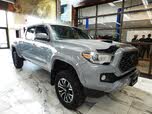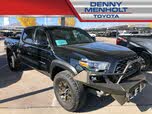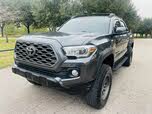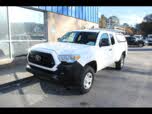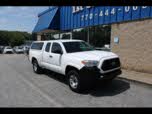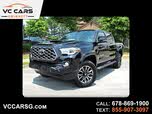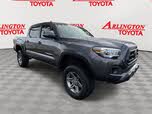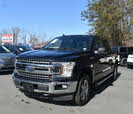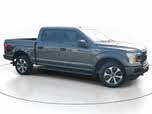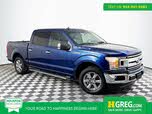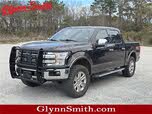2020 Toyota Tacoma vs 2019 Ford F-150
Overview | ||
MSRP | $28,155 | $26,050 |
Average price | $28,942 | $30,202 |
Listings | ||
Ratings & Reviews | ||
User reviews | ||
Expert reviews | 8.2 out of 10Read full review | 7.5 out of 10Read full review |
Pros & cons | Pros
| |
Summary | The notion of "luxury trucks" might seem a little weird if you haven’t bought a new truck in 20 years, but anyone who's been in the market lately should be more than familiar with the idea. Not only that, they should be more than accustomed to the sticker shock associated with these high-end, luxury pickups. Some old-school types will scoff at how trucks have gotten soft or too expensive (or both), but good automakers build the cars and trucks people want, and shoppers have been snatching luxury trucks as fast as they can be built and shipped. These "soft" trucks offer a template for seemingly dozens of purposes. They can tow, haul, carry people and goods, play road-trip family car, and even be the ride for a night on the town. The Chevy Silverado, GMC Sierra, and Ram 1500 all got redesigned for 2019, while the F-150 was last updated in 2018, following a full redesign for 2015. There are a few modest feature updates for 2019 as well, but will that be enough when the F-150’s main competition is all-new for the same model year? | Growing up in the post–Marty McFly era, I saw small Toyota pickups everywhere in America. When the American automakers abandoned this market in the late 2000s, Toyota kept on trucking. The Tacoma remains the best-selling midsize truck in the US—it's more popular than the Chevrolet Colorado, GMC Canyon, and Nissan Frontier combined. The Ford Ranger isn’t a threat, either. Nearly a quarter-million people purchased a Tacoma last year, a vehicle that by any measure is loud, slow, and defiantly old-fashioned. It’s the capability, size, and dependable off-road features that keep Tacoma buyers satisfied. For 2020, it gets few but important design and technology updates to push this rough-and-tumble pickup into modern times. |
Video | ||
Popular Features & Specs | ||
Engine | 3.3L 290 hp V6 Flex Fuel Vehicle | 2.7L 159 hp I4 |
Drive Train | 4X2 | 4X2 |
Seating Capacity | 3 | 4 |
Horsepower | 159 hp @ 5200 rpm | |
MPG City | 19 | 20 |
MPG Highway | 25 | 23 |
Engine | ||
Engine Name | 3.3L 290 hp V6 Flex Fuel Vehicle | 2.7L 159 hp I4 |
Torque | 180 lb-ft @ 3800 rpm | |
Horsepower | 159 hp @ 5200 rpm | |
Drivetrain | 4X2 | 4X2 |
Fuel Economy | ||
MPG City | 19 | 20 |
MPG Highway | 25 | 23 |
Interior | ||
Seating Capacity | 3 | 4 |
Safety | ||
Front Crash Overall | 4 | 4 |
Side Crash Overall | 5 | 5 |
Dimensions & Capacity | ||
Bed Length | 78.9 in | 73.7 in |
Cargo Space | 12.1 cu ft | |
Curb Weight | 4069 lbs | 3915 lbs |
Height | 75.5 in | 70.6 in |
Length | 209.3 in | 212.3 in |
Width | 96.8 in | 74.4 in |
Wheelbase | 122.4 in | 127.4 in |
Maximum Payload | 1990 lbs | 1685 lbs |
Number of doors | 2 | 4 |
Maximum Towing Capacity | 9200 lbs | 3500 lbs |
Standard Towing Capacity | 5100 lbs | |
When the 2019 Ford F-150 was redesigned in 2015, it attracted significant attention. The twin-turbocharged EcoBoost emerged as a high-feature engine, not aimed at replacing the V8 but as a credible alternative. The F-150's extensive use of aluminum body panels was another standout feature. Since the truck had already been refreshed the previous year, there were no visual changes from 2018 to 2019.
General Motors had previously mocked the F-150's aluminum body in ads, suggesting that the lightweight material would be more prone to damage. Ironically, the new Silverado used aluminum for the hood, doors, and tailgate. Previously, Chevy had even aired ads making fun of the F-150’s tailgate step. Yet, a decade later, the 2019 GMC Sierra featured a similar bed step, the Multi-Pro tailgate.
The F-150 offered several trims, including XL, XLT, Lariat, King Ranch, Platinum, Raptor, and Limited. The base XL was quite barebones, equipped mainly with a reversing camera, AM/FM radio, a 4.2-inch audio-system screen, and dynamic hitch assist for towing. The XLT added features like power windows and an upgraded 8-inch Sync 3 infotainment screen. The Lariat trim introduced a leather interior, heated and ventilated front seats, and satellite radio.
The King Ranch, driven by reviewers, has been a mainstay since 2001, contributing to the luxury truck trend alongside the GMC Sierra Denali. The King Ranch featured an appealing interior option called Camel Back and a “flying W” embroidery on the center console cover. The Platinum trim went a step further, incorporating unique wood panels and power-deploying running boards.
The Raptor distinguished itself as a high-performance off-road truck with a wide-body kit, specialized underbody armor, and Fox Racing Shox. Meanwhile, the Limited trim was the epitome of luxury, boasting unique 22-inch polished aluminum wheels, a dual-panel moonroof, dual exhaust, and optional massaging seats like those in the King Ranch.
In contrast, the 2020 Toyota Tacoma had a clean, simple design. However, the back doors had a tinny sound reminiscent of older Toyota trucks, and the hood scoop was purely aesthetic. The Tacoma’s distinct body, available in extended Access or four-door Double Cab forms, struck a balance between functionality and rugged appeal. Despite its larger modern size, the Tacoma remained more manageable and city-friendly compared to full-size pickups.
The Limited trim featured 18-inch wheels, but the TRD Pro trim, driven by reviewers, took things further with redesigned LED headlights, sequential turn signals, and the Army Green flat paint. The TRD Pro’s grille featured a chunkier design with "TOYOTA" spelled out in caps, and other unique features included an aluminum skid plate, exposed red shocks from Fox Racing, and 16-inch black TRD wheels with all-terrain tires.
Inside, the Tacoma retained a straightforward look. The dash had long rectangular planes and was equipped with a modestly sized touchscreen flanked by functional controls. Some models had orange trim to brighten the otherwise all-black interior, and the TRD Pro came with leather seats, though the quality was sub-par. While fit and finish were better compared to competitors like the Ford Ranger and Nissan Frontier, the materials were mainly basic plastics and rubbers.
For 2019, the Ford F-150 introduced a new engine: the 3.0-liter Power Stroke turbodiesel V6, delivering 250 horsepower and 440 pound-feet of torque. Although its horsepower was modest, its torque was impressive. The engine lineup remained mostly unchanged, with the base engine being a 3.3-liter V6 with 290 hp and 265 lb-ft of torque. A 2.7-liter twin-turbo EcoBoost engine was also available, producing 325 hp and 400 lb-ft. Additionally, the larger 3.5-liter EcoBoost V6 returned with either 375 hp or 450 hp, the latter now available in the Limited trim that was previously Raptor-exclusive. For those preferring a V8, the 5.0-liter Coyote V8 provided 395 hp and 400 lb-ft.
The diesel engine could tow up to 11,400 pounds when properly equipped, which, while not best-in-class, was sufficient for most towing needs. The 10-speed automatic transmission, standard on all but the base trim, allowed engines to operate efficiently within their power bands. Inside the cabin, the diesel engine was quiet, making for a smooth drive, though the start/stop system revealed its presence when the engine rumbled back to life. The diesel variant offered competitive fuel economy, with RWD models achieving 22 mpg city, 30 highway, and 25 combined, while the most efficient non-diesel engine, the 2.7-liter EcoBoost, delivered 20 mpg city, 26 highway, and 22 combined. The least efficient was the V8 with 4WD at 16 mpg city, 22 highway, 18 combined.
Toyota's 2020 Tacoma offered a less appealing base 2.7-liter 4-cylinder engine with 159 hp and 180 lb-ft, which was underwhelming for a vehicle of its size. On the other hand, the 3.5-liter V6, optional on lower trims and standard on higher ones, was more promising with 278 hp and 265 lb-ft. The Tacoma's 6-speed automatic transmission and RWD were standard, with 4WD and a manual transmission available depending on the trim. The TRD Pro trim, particularly, featured 4WD with an electronic low-range transfer case.
The TRD Pro's manual transmission included Clutch Start Cancel, enabling restarts in first gear without the clutch, useful for off-road scenarios. However, it lacked Toyota's Multi-Terrain Select (MTS) and Crawl Control, which assisted with traction and low-speed driving, respectively. The TRD models also had an electronic locking rear differential and 9.4 inches of ground clearance, making them highly capable off-road.
On paved roads, the Tacoma's steering was slow and imprecise, and the V6 engine, without the "ECT PWR" button activated, felt sluggish as it moved through its six gears. The TRD Pro's sport exhaust became tiresome over time, and its fuel economy was poor at 18 mpg city, 22 highway, 20 combined for the V6, lagging behind some full-size V6 trucks.
Nevertheless, the Tacoma’s ride was supple, and it could tow up to 6,800 pounds with a 1,440-pound payload capacity, justifying its off-road prowess and compensations at the pump.
The 2019 Ford F-150 offered a variety of bed and cab configurations. The single cab could be coupled with the standard or long bed; the extended SuperCab came with short, standard, or long beds; and the full 4-door SuperCrew paired with short or standard beds. The SuperCrew version driven by reviewers had an expansive cabin with generous front storage options, including deep cupholders, a massive center console, and large in-door bins. The rear seats provided ample legroom, and the fold-up rear bench created a vast load floor for additional cargo space.
The 2020 Toyota Tacoma's smaller size compared to full-size trucks was a key advantage. It was easier to maneuver and park, had a reasonable turning circle, and fitted well in standard garages. The Tacoma's bed offered practical features like a rail system with movable cleats, an optional power outlet, and LED lighting. Buyers could choose between a 5- or 6-foot bed, depending on the model. However, the Double Cab’s rear seats were cramped for long trips, and while they included a USB port, they lacked air vents and a flat loading floor. A power-sliding rear window was handy, but the absence of a rear defroster was a downside. Given its design, the Tacoma was more practical for city driving and moderate off-roading.
When comparing cargo capacity, the F-150's diverse configuration options, larger cabin, and higher towing capacity made it more versatile and roomy. Conversely, the Tacoma's smaller build offered easier handling and adequate features for light-duty trips and off-road adventures.
The 2019 Ford F-150’s base XL trim included a basic Sync infotainment system with a 4.2-inch screen, audio controls, and Bluetooth connectivity. Higher trims upgraded to Sync 3 with an 8-inch touchscreen, which was known for its intuitive navigation and easy-to-read icons. Sync 3 supported Android Auto and Apple CarPlay, the latter accommodating third-party map apps like Waze and Google Maps post-iOS 12 update. The King Ranch trim also boasted features like a Wi-Fi hotspot and a B&O Play premium sound system.
The 2020 Toyota Tacoma kept its interior technology straightforward and user-friendly. It featured a 7-inch touchscreen as standard, with an 8-inch version available, offering navigation, cloud-based traffic routing, and efficient online searches. Standard for 2020 were Apple CarPlay, Android Auto, and Amazon Alexa, plus a new USB-C port. Optional features like wireless phone charging, onboard Wi-Fi, and a proximity key with push-button start added to its appeal. The Tacoma came with 360-degree cameras for parking and off-road views, as well as standard driver assists like adaptive cruise control. However, its overall infotainment wasn’t the best, though it remained functional and easy to use.
The 2019 Ford F-150 included a full array of front- and side-impact airbags, traction control, and a reversing camera as standard safety features. For the 2019 model year, the 360-degree camera system became standard on the Limited trim and optional on others, offering multiple individual angle views. Additional driver-assistance features like blind-spot monitoring, forward-collision avoidance, adaptive cruise control, and rear cross-traffic alert were available, enhancing overall safety.
The 2020 Toyota Tacoma introduced more standard safety features, such as forward-emergency braking with pedestrian detection and lane-departure warning. Options included blind-spot monitoring and parking sensors. The Tacoma earned a 4 out of 5-star rating in NHTSA crash tests, with top ratings for rear passenger side-impact protection. It was also an IIHS Top Safety Pick, receiving Good ratings in five crash tests and an Acceptable rating for the front passenger in the small overlap test.
CarGurus highlights
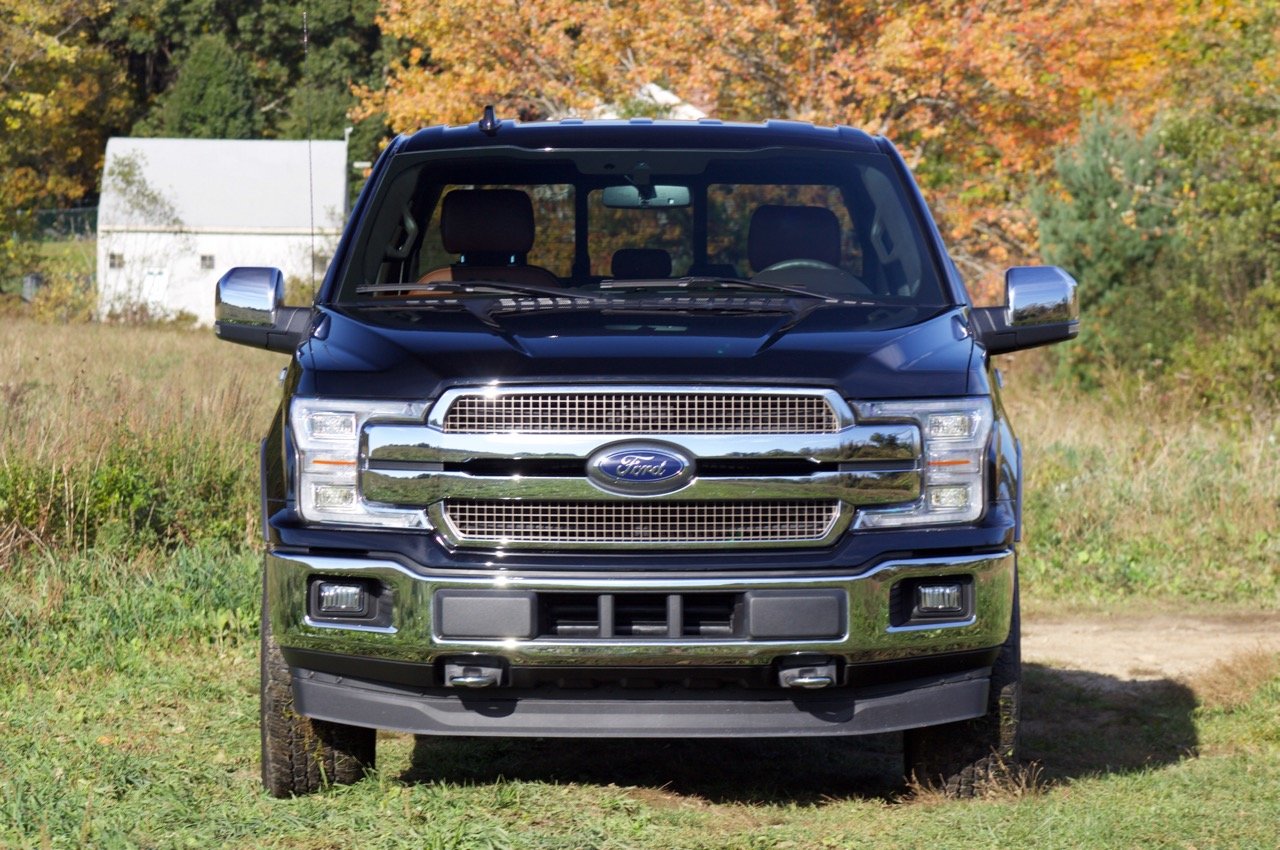
According to CarGurus experts, the overall rating for the 2019 Ford F-150 was 8.2 out of 10, while the 2020 Toyota Tacoma scored 7.5 out of 10. Given these ratings, the 2019 Ford F-150 edges out the Tacoma as the recommended truck. Its superior versatility, advanced technology, and higher towing capacity make it the better overall choice for a broader range of truck buyers.
Choose the 2020 Toyota Tacoma if:
Shop Now- You seek a more city-friendly, maneuverable truck with a tighter turning circle and easier parking.
- Off-roading capabilities are a priority, with robust features like Multi-Terrain Select and Crawl Control.
- Simple, intuitive interior technology and standard driver aids like adaptive cruise control appeal to you.
Choose the 2019 Ford F-150 if:
Shop Now- You need a versatile truck with multiple bed and cab configurations and higher towing capacity.
- You appreciate a variety of engine options, including a potent V6 EcoBoost and a powerful V8.
- You value advanced tech features like Sync 3, Apple CarPlay, and a premium sound system.

By: CarGurus + AI
At CarGurus, our team of experienced automotive writers remain at the heart of our content operation, conducting hands-on car tests and writing insightful guides that are backed by years of industry experience. To complement this, we are harnessing AI to make our content offering more diverse and more helpful to shoppers than ever. To achieve this, our AI systems are based exclusively on CarGurus content, ratings and data, so that what we produce is both unique to CarGurus, and uniquely helpful to car shoppers.



















